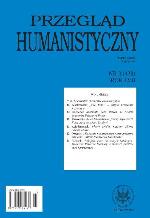O entropii pozytywizmu w kulturze polskiej
On the Entropy of Positivism in Polish Culture
Author(s): Maciej GlogerSubject(s): Cultural Essay, Political Essay, Societal Essay
Published by: Wydawnictwa Uniwersytetu Warszawskiego
Summary/Abstract: ON THE ENTROPY OF POSITIVISM IN POLISH CULTURE Summary In the article the presence and the transformations of the Positivist tradition (approx. 1864–1900) in Polish culture. Positivism was understood broadly, to cover its literary, social, political, philosophical and religious implications. Cultural influence of Positivism is very strong still in the Modernism (until 1918), eg. in the writings of Stanisław Brzozowski, Stefan Żeromski, Władysław Mieczysław Kozłowski, Jan Władysław Dawid. Polish nationalism and the national democratic thought (eg. that of Roman Dmowski) has much in common with the Positivist goals. In the interwar period the impact of Positivism weakens. After World War II the Marxists undertake to establish a link to scientific worldview of the Positivism as well as to the poetic of realism, in order to legitimize the imposed O entropii pozytywizmu w kulturze polskiej 37 Communist system. In the 1960s Juliusz Mieroszewski, a major intellectual and an émigré cooperating with the Paris “Kultura” of Jerzy Giedroyc, refers to the legalist political ideas and the rule of evolutionism. A specialty of Polish Positivism are its frequent relations to metaphysical and religious issues, to be noticed in the social and philosophical reflections of thinkers, writers and social activists of many epochs and circles, in particular in the Modernist period (eg. J.W. Dawid), recently in the writings of Stefan Bratkowski from the 1990s, and in the interwar period in the philosophy of Wincenty Lutosławski. Trans. M. Bucholc
Journal: Przegląd Humanistyczny
- Issue Year: 436/2011
- Issue No: 05
- Page Range: 25-37
- Page Count: 13
- Language: Polish
- Content File-PDF

